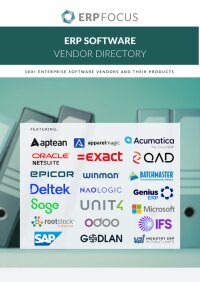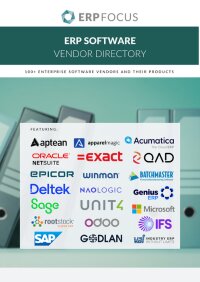Free white paper

ERP Software Vendor Directory
Put the most comprehensive ERP vendor directory on your desk today
The contract you sign with your ERP software vendor depends, to a large part, on how risk averse they are, and how risk averse you are. In addition to specifying what is being purchased, the contract will also try to specify everyone’s responsibility in the event there are problems with the ERP implementation. Because of this, your purchasing contract could be dozens of pages long.
Get help interpreting the contract. If your legal department does not have specific experience in software contracts, it is a good investment to hire a legal specialist to review and advise on your contract. The contract you initially receive is going to be heavily slanted toward protecting the ERP vendor’s interest. They will list special failure circumstances for which they wish to be contractually specified to be free from liability. They may seem odd when you read them; what you start to realize is that this is a list of all the litigations that have gone against an ERP vendor. They’ll say that if their software crashes your hardware, it isn’t their responsibility; they’ll say that if someone gets past your firewall and puts a virus in their software it isn’t their responsibility; they’ll say that if you mislead them on the requirements and something they didn’t know about doesn’t work, it isn’t their responsibility. The proper response for you, and your legal counsel, is to sort out the issues in which there could be shared culpability, and clarify responsibilities. In order to do this well, you have to spend a lot of time assuming things go wrong; very little of a contract is applicable to an ERP project which avoids failure.
An ERP software contract will also specify the financial arrangements, and how financial arrangements are verified. For instance, if the sales module is based on number of users, how will the vendor verify the number of people using the system? What happens if they find a discrepancy? Also included will be all of the agreements around the maintenance contract. On what number is the annual percentage based? Can the annual percentage change? If so, how often, and how much? These financial process decisions should be spelled out in the contract.
And lastly, there will probably be a handful of addendum pages specific to your negotiation and your particular ERP software contract arrangements. Perhaps you achieved a special discount on certain module combinations, or you wanted a contractual guarantee on a future option. These things would appear as addendums to the main contract.
Obviously, you hope that after the initial signing, you never have to refer to the contract again – a likely occurrence if the ERP implementation goes smoothly. However, as stated earlier, you have an obligation to your organization to protect its interest – as best you can – in the event you have been mislead, or the product’s performance has been misrepresented. The only way you can do that is to ensure that the contract you sign is fair and reasonable. And remember – get experienced legal help.

Put the most comprehensive ERP vendor directory on your desk today
